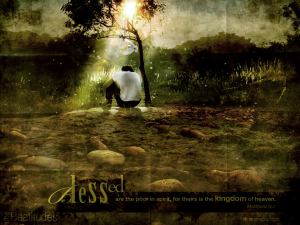Rich or poor, which is better?
Beatrice Kaufman, the wife of playwright George S. Kaufman once quipped “I’ve been rich and I’ve been poor. Rich is better.”[1] This sentiment is undoubtedly shared by many for we quite obstinately hold to the belief, despite evidence to the contrary, that wealth can indeed purchase greater happiness. Studies conducted of people whose fortunes dramatically changed have consistently shown that whether the change was considered positive (winning an enormous sum of money) or negative (accidental dismemberment or physical impairment) one’s level of personal happiness returned to prior levels in very short order.[2]

Poor in spirit
Rich or poor, true happiness comes from within, from that interior place reserved for you and God, your soul, your spirit. When Jesus told his disciples “Blessed are the poor in spirit, for theirs is the kingdom of heaven”[3] we instinctively apply a temporal connotation of wealth or poverty to what he taught. And in doing so we find ourselves rebelling, dismissing any thought that abject poverty is the only way to reach the kingdom of heaven. When asked by a young man what more he had to do to gain eternal life, Jesus told him, “’If you wish to be perfect, go, sell what you have and give to the poor, and you will have treasure in heaven. Then come, follow me.’ When the young man heard this statement, he went away sad, for he had many possessions.”[4] That response leads us to believe that we must give away our possessions in order to attain a place in heaven. But I would suggest that we, as we too often do, have missed the point, or more precisely, the points.
Jesus commands us to be “poor in spirit” which calls for us to fill our souls with humility, to be “humble in spirit.” This requires us to recognize and acknowledge that we are imperfect, broken creatures before God.
A rich spirit is a proud, self-important spirit, full of one’s self, with little or no regard for one’s Creator. And this leads us to consider the difficulty that the young man who had many possessions faced. There is a strong correlation between interior and exterior pride for the greater and more abundant our possessions – those things that we possess – the poorer our spirituality and the poorer our relationship with God. It is axiomatic that when we are obsessed by our possessions we lose sight of all that is of greater importance, our souls. Like the young man, our possessions will soon possess and consume us and like that young man we will walk away saddened by the necessity to give it all away to the poor.
Whether rich or poor, it is in kneeling before God with great humility that will be the measure upon which we will be judged. Anyone who humbly asks God for mercy will receive it. The difference will be in the degree of difficulty one faces in becoming “poor in spirit.” As Mary proclaimed, “The hungry he has filled with good things; the rich he has sent away empty.”[5]
[1] Leonard Lyons, New York entertainment columnist, Washington (DC) Post, May 12, 1937.
[2] Jonathan Haidt, The Happiness Hypothesis, New York: Basic Books, 2006.
[3] Mt 5:3.
[4] Mt 19:21.
[5] Lk 1:53.
